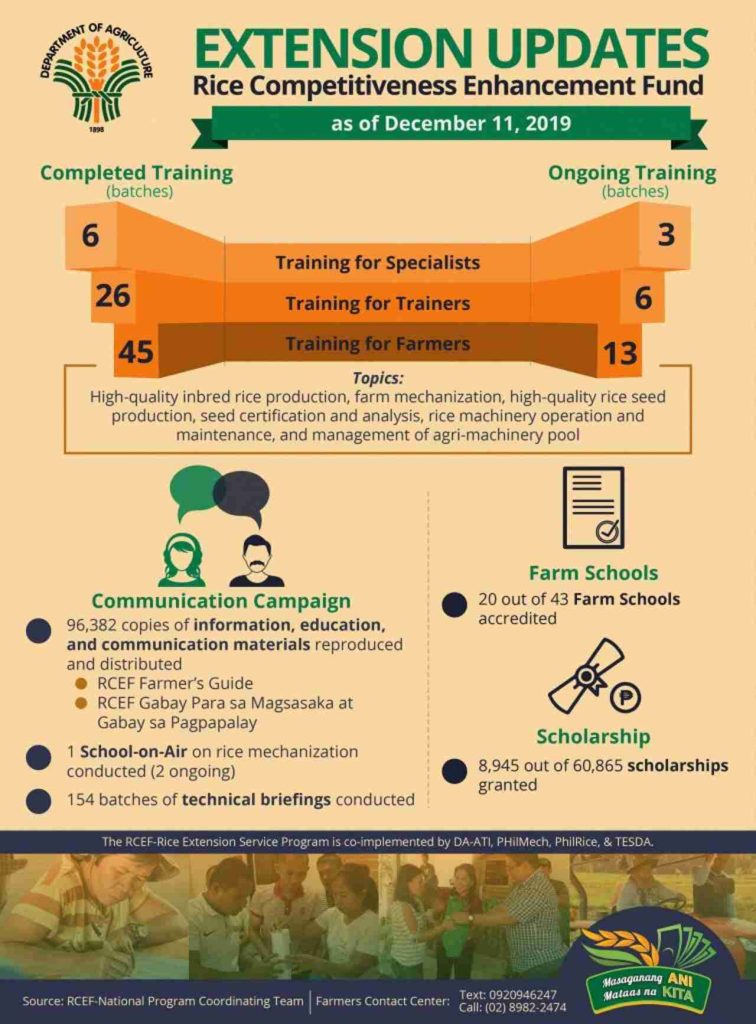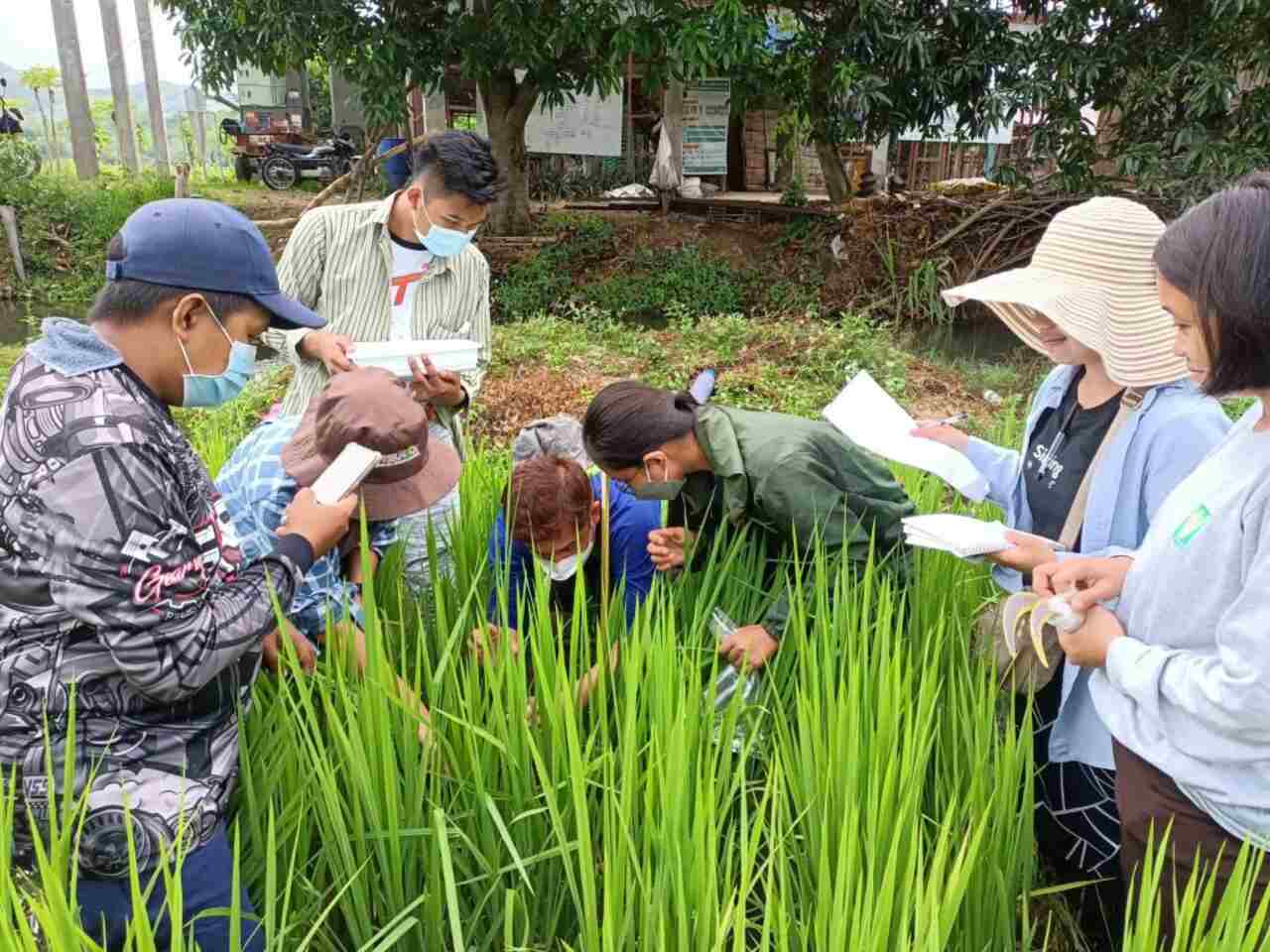The DA RCEF Rice Extension Services Program (RESP) is one of the four major components of the Rice Competitiveness Enhancement Fund (RCEF) created under Republic Act No. 11203, also known as the Rice Tariffication Law, which seeks to boost the productivity and profitability of Filipino rice farmers. Implemented by the Department of Agriculture through ATI, PhilRice, PHilMech, and TESDA, the RESP provides free training, scholarships, and technical assistance to improve farmers’ knowledge in modern inbred rice production, mechanization, seed certification, and agribusiness. Launched in response to the liberalization of rice imports, the program aims to help farmers remain competitive and reduce production costs through skills enhancement and access to modern technologies.
If you’re a rice farmer in the Philippines looking to boost your knowledge, skills, and productivity, this program offers government-funded training opportunities that support more sustainable and profitable rice farming, along with targeted agriculture training, scholarships, and capacity-building activities to help rice farmers and their organizations improve efficiency and income. In this guide, we listed everything you need to know about how to apply, who qualifies, what benefits are offered, and how the RCEF-RESP training works—from enrollment to certification.
Program Overview

The DA RCEF RESP is designed to enhance the capability of rice farmers through structured training, modern farming techniques, and access to updated information. It is implemented by the Agricultural Training Institute (ATI) in collaboration with the Philippine Rice Research Institute (PhilRice), the Philippine Center for Postharvest Development and Mechanization (PhilMech), and the Technical Education and Skills Development Authority (TESDA).
Why Join the RCEF RESP?
Although RESP is not a financial subsidy, it provides long-term financial assistance through knowledge and skills development. By improving production techniques and lowering costs, rice farmers can become more competitive and sustainable in the long run.
Participating in the program can help farmers:
- Use certified inbred seeds for better yields
- Apply cost-efficient production techniques
- Operate and manage farm machinery more effectively
- Comply with rice seed certification standards
- Gain credentials and pass TESDA competency assessments
What Does the Program Offer?
The RCEF-RESP focuses on four main areas:
- Design and Delivery of Training Programs
- Enterprise Development Assistance
- Communication and Information Campaigns
- Training Scholarships via Accredited Farm Schools
It also includes support for the development and accreditation of Farm Schools, training of agricultural extension workers, and the rollout of information materials.
What Kind of Training is Available?
The RESP offers a wide range of training programs designed for various participants, from new farmers to specialists and extension workers. Here’s a breakdown:
For Farmers and Cooperatives
- Farmers Field School on Inbred Rice/Seed Production (by ATI and TESDA)
- Other Rice-Related Training such as cost reduction, pest management, and climate-resilient practices
- Seed Certification and Inbred Seed Production for aspiring seed growers (with ATI and BPI-NSQCS)
- Refresher Courses for Seed Growers
- Training on Farm Mechanization and the Operation and Maintenance of Agri-Machinery
For Specialists
- Rice Specialist Training Course (PhilRice)
- Resource Person Development (PHilMech) for:
- Rice machinery operations
- Management of agri-machinery pools
- Seed Testing & Certification (BPI-NSQCS)
For Extension Workers
- Training of Trainers (TOT) courses on:
- High-quality inbred rice and seed production
- Refresher courses for rice extension workers
- Agri-machinery maintenance and operations
How Are Training Slots Allocated?
The number of training slots per province depends on several factors, including:
- Area planted to rice
- Yield levels
- Adoption of inbred seeds and farm machinery
- Production costs
- Number of agricultural extension workers
This proportional allocation ensures that areas with higher needs or potential receive appropriate support.
Where is the RCEF RESP Implemented?
The program covers 57 provinces across the Philippines, representing around 1,010 municipalities and approximately 1.89 million rice farmers listed in the RSBSA. These areas were selected based on their potential to improve rice production, competitiveness, and cost efficiency.
Who Can Apply?
The primary beneficiaries of the program are:
- Rice farmers listed in the Registry System for Basic Sectors in Agriculture (RSBSA)
- Members of DA-accredited farmer cooperatives and associations (FCAs)
- Farm workers, especially those located in the 57 priority provinces covered by RCEF
Eligibility Criteria
To qualify for the RESP, individuals and organizations must meet the following:
For Farmers
- Must be registered in the RSBSA
- Must be actively farming rice
- Must be located in an RCEF priority municipality
For Farmer Organizations
- Must be recognized or accredited by the DA
- Should have members whose rice farms form a cluster of at least 20 hectares in one or two adjacent villages
- Must operate within a selected RCEF-covered city or municipality
How to Apply for a Scholarship Through Farm Schools
Farmers and farm workers can also apply for scholarships to attend Farmers Field Schools (FFS) through DA-accredited farm schools. The training runs for 3 to 11 days, depending on the course offered.
Step-by-Step Process
To apply for the program, you need to follow these steps:
Step 1. Farm School Registration
Farm Schools must register their training programs with the relevant government agencies.
Step 2. Scholarship Application
Interested farmers apply for a scholarship directly through these Farm Schools.
Step 3. Scholarship Grant
If accepted, TESDA will issue the scholarship covering tuition and other training-related costs.
Step 4. Training Implementation
Farmers attend and complete the required sessions at the Farm School.
Step 5. Competency Assessment (Optional)
Some programs may include an assessment to verify knowledge gained.
Step 6. Post-Training Requirements
Farm Schools submit necessary documentation for billing and reporting.
Program Accomplishments (As of Latest Reports)
Since its launch, the RCEF-RESP has achieved the following:
- 99 training activities held nationwide, including those for regional coordinators, extension workers, farmers, and FCAs
- 8,945 scholarships granted to farmers and farm workers
- 96,382 information materials printed and distributed
- 154 technical briefings conducted for participants
- 43 target Farm Schools, with 20 already accredited
- 3 School-on-Air (SoA) programs launched on rice mechanization (1 completed, 2 ongoing)
The P1 billion fund allocation—which is 10% of the total P10 billion RCEF—supports the continued development of modules, training resources, and communication efforts.
How the Budget is Shared
- TESDA receives 70% of RESP funds for scholarship and training implementation.
- ATI, PhilRice, and PhilMech each receive 10% for curriculum design, training facilitation, and expert development.
Video: RCEF RESP
The DA RCEF RESP offers training and education opportunities that can directly contribute to increased productivity and profitability in rice farming. With its well-structured scholarship program and focus on certified inbred rice production, modern mechanization, and organizational development, this program can support your farming journey—especially if you’re listed in the RSBSA or a member of an accredited cooperative.
To apply, visit your nearest accredited Farm School, TESDA office, or the DA regional field office in your province.
